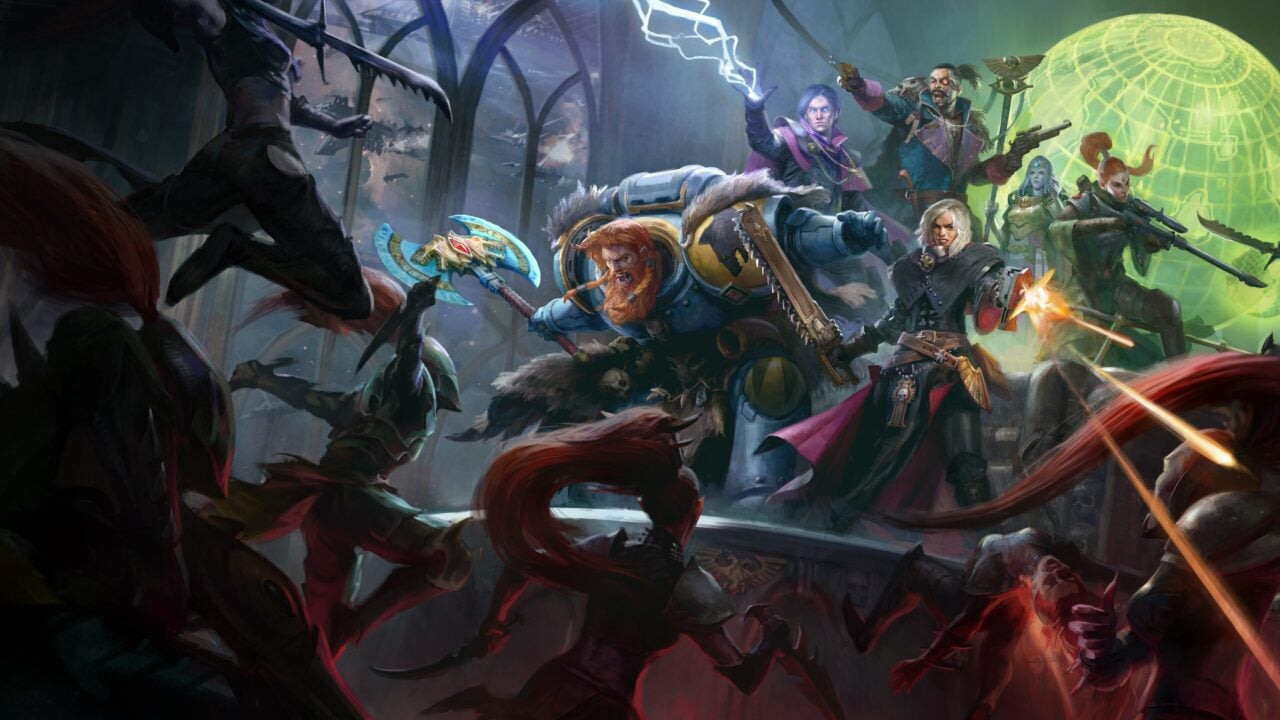
Sitting unattended in my Steam library was Warhammer 40,000: Rogue Trader. A game that I immediately decided to buy once it went official, it sat for a few months before I had the time to play it. Once I did start, the late nights and lack of sleep started. Such is the game made and developed by Owlcat Games as it is a modern title tackling the adventures of a Rogue Trader in the Warhammer 40,000’s rich universe. But is the game actually good? Is it also a recommended title for non-fans of the franchise? Let’s find out as we review Warhammer 40,000: Rogue Trader!
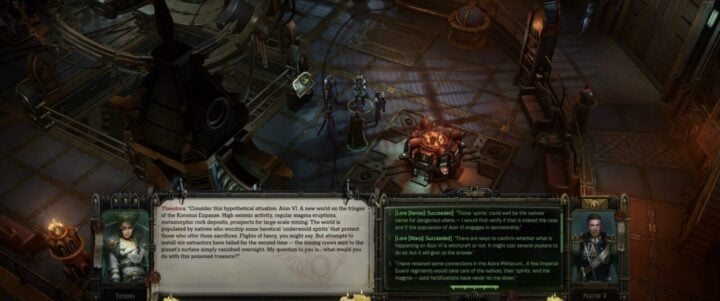
The game takes place in the universe of Warhammer 40,000. Demons, aliens, and humanity all vie for supremacy in the Milky Way Galaxy. Mankind has found itself under attack from all sides and its galaxy-spanning empire under duress with threats both supernatural and physical. In this universe, you get to play as a Rogue Trader, a representative of mankind and blessed by the God-Emperor to go to the furthest reaches of the galaxy. As a Rogue Trader you also get some handy benefits that are far above the common man. This include the capability of establishing an empire among other things. You also get the license to consort with aliens which is big given the setting.
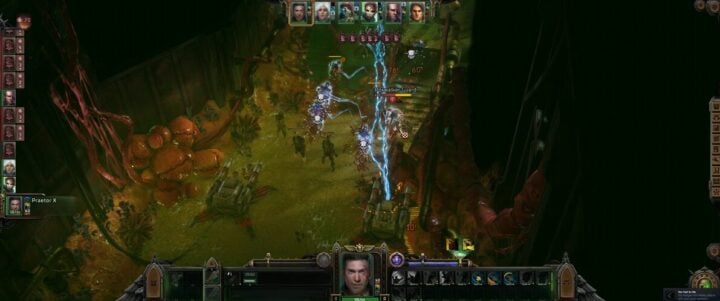
The opening of the game sets you immediately into the spotlight. A relative of yours, a Rogue Trader, is about to choose an heir to her title. With you present in the ceremony, you get a glimpse of what life is for a Rogue Trader. After enjoying the company of everyone and seeing their awe at the might of your Rogue trader relative, you get pulled into a conspiracy (like what is done in most CRPGs) with the Rogue Trader being attacked and assassinated. Since you are the closest heir that survived, you get to wear the mantle of the Rogue Trader (yey!) Unfortunately for you, you also get the responsibilities that go with it.
As mentioned earlier, your holdings are under attack from various factions. Your attackers include a demon-worshiping cult, aliens that thrive from sadism and cruelty, and of course, the secret police of the Imperium, the Inquisitors. With everything not working well, you get to the helm of your massive flagship and zoom around the Koronus expanse to save what needs to be saved, or be a strict dogmatic follower of the Imperial cult, or be a heretic that worships demons. Either way, you have to work as a Rogue Trader with all the benefits and responsibilities carried by the title.
Without revealing too much of the game’s rich and expansive lore, playing a Rogue Trader in this game is quite amusing. In modern times, Rogue Traders are not as fleshed out in terms of lore as Space Marines and the Imperium’s state of affairs are taking the forefront of lore development in Warhammer 40,000. It’s also interesting that Owlcat managed to string in the different factions and how the grimdark setting plays out in Rogue Trader.
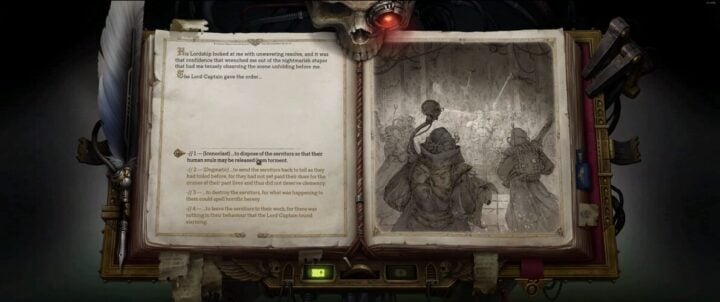
In terms of player choice, you also get the equivalent of what usually happens in this universe. As mentioned earlier, the grimdark setting is quite prevalent and you can see how it affects the world itself. For example, the game throws at you choices that would have been obvious in reality. Say you meet refugees running away from a demonic scourge. Would you take them in? If you want to be the typical good guy samaritan, you’d take them in. However, that decision may not necessarily give out a good result. These individuals might be cultists hiding in plain sight. Once you take them in, they start converting your ship’s residents to their cause. Choices such as the previous example spice up the game as consequences really do matter and taking the good guy route does not necessarily mean that you also get good results. It doesn’t get more grimdark (and grimdank) than this.
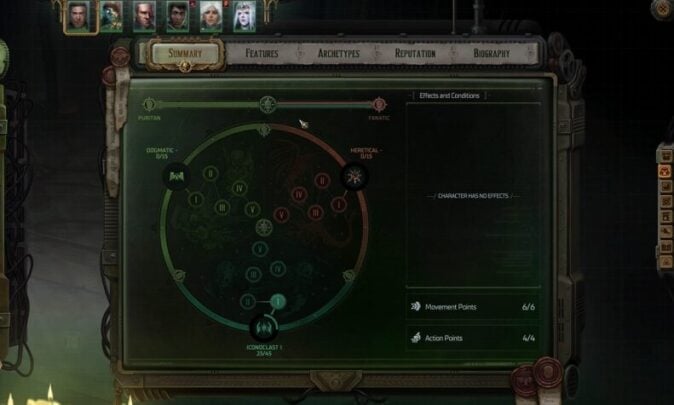
From the get-go, you get to focus your choices on three distinct convictions or styles: Dogmatic, Iconoclast, and Heretical. As the name implies, you get to align yourself with the three general beliefs in the Warhammer 40,000 universe. Dogmatic choices are actions that are inline with the imperial cult. This means that your actions are always on “FOR THE EMPEROR!” and with your mouth frothing as you shout and bash the heretics. Iconoclast is the typical good guy with choices and actions focused on the good of the people/aliens/beasts around you. Heretical actions are obviously actions made and done for the dark gods such as sacrificing people wantonly or appeasing demons.
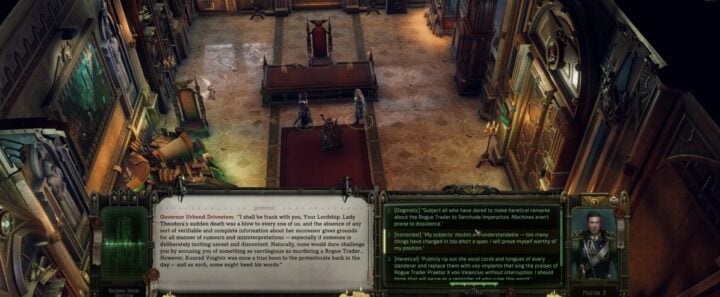
The system develops and progresses to different levels. The more you do certain actions, the more you get points to level up your morality grade. However, you can also mix and match the choices. In my playthrough, I played a balance of Dogmatic and Iconoclast. These choices also affect NPC interactions as the morality level unlocks available dialogue. Not only that but you also get to wear and equip unique gears that are locked to certain morality traits.
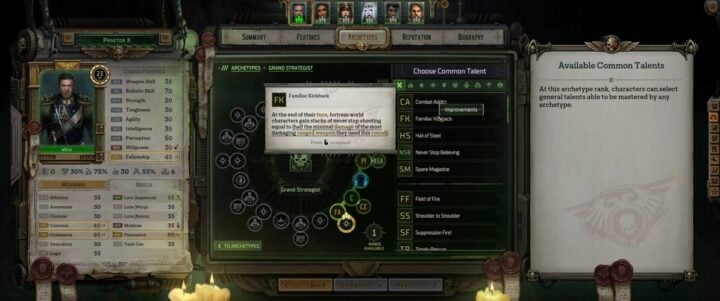
What would take a lot of time in Rogue Trader is its complex leveling system. As you level up, you get to choose from perks and active abilities that you can take into combat. The perks that you can choose from depend on the Archetype (role/job) that you chose to progress to. These perks then provide you with passive benefits once you meet certain conditions. And as you level up, the technical terms that the game bombards you with increases.
Although simple enough if you have time to read through a novel, the leveling system is not pulling any punches in details and text. The problem that I had was that the details mush up and having to read through the perks of all different roles was the chore. Rogue Trader makes you read through player dialogue options but it makes you read more as you choose your character’s next perk. It’s not surprising to read that some players also had trouble with this system.
However, as mentioned, you can get your money’s worth if you do take time to read each skill/perk’s description. As you get more into it, the rewards are astoundingly great as you min-max specific characters for certain builds. It may sound tedious (because it actually is) but the more you get familiar with the combat system, the more you get out of it. But then again, I won’t blame you if you give up on the game because of its text-heavy leveling system.
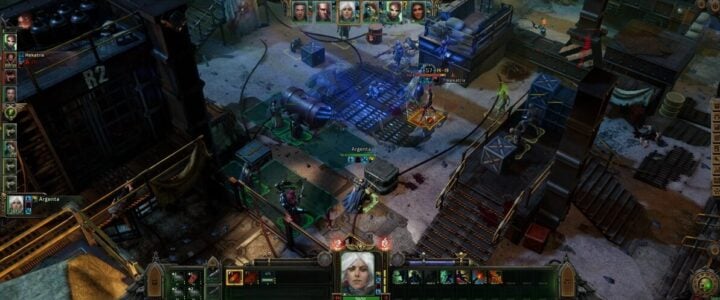
Slog. It’s the word that I can best describe the combat in Rogue Trader. As a turn-based tactical game, you get to choose positions, check line of sight, and apply typical buffs/debuffs. Every round, your characters must perform certain actions in order to win as you are very likely find yourself outnumbered with a ratio of 1:5. In boss fights, battles usually last more than 15 minutes depending on difficulty and player progression. This also includes save scums.
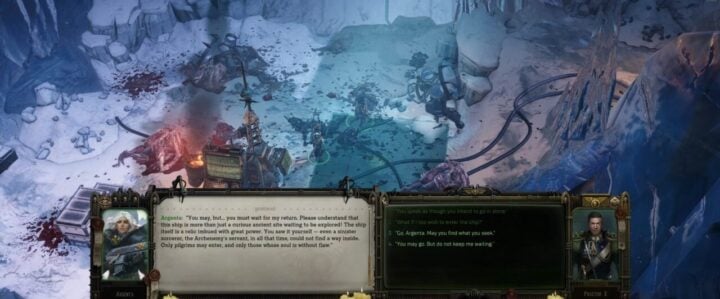
Probably what made me play the game until the very end are the companions. With a rich cast, Rogue Trader introduces various characters that make the game all the more spectacular. Since you are a Rogue Trader, you also don’t have to exclusively talk with humans as you have a license to bring with you a retinue that could include aliens.
All companions in the game are fleshed out and have their own particular character quests. They are also fully voiced and banter between your adventures. What I did really like are the companion quests as they do take a huge chunk of time and you do get rewarded well with more lore, better equipment, and of course, a better character ending for them. I can personally say that I liked the companion quests more than the main quest line.
Rogue Trader is a standard 3D CRPG game. Everything is fully rendered and you can rotate your camera to fully view the surrounding area. It’s not graphically intensive and impressive but the engine is good enough to portray the universe of Warhammer 40,000.
Voice acting in the game is great. The characters of each companion are distinct and it’s also great that the banters and combat speeches are fully voiced. Just be prepared to hear repeated dialogue once their turn comes up.
Music is what you would expect from a Warhammer 40,000 game: a grand orchestra with influences from Christian chants and hymns.
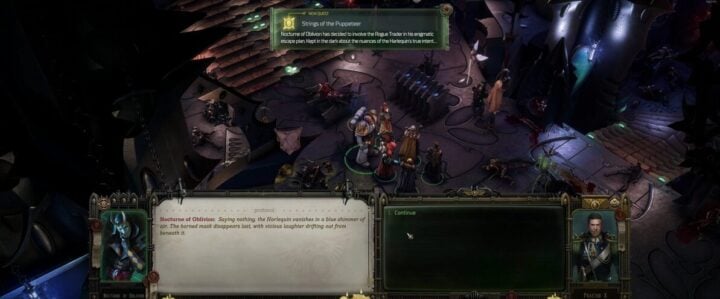
There’s no denying that Rogue Trader is a must-have for any Warhammer 40,000 fan. This game is seriously lore-rich and has been careful in handling well-established lore. If reading wikis that are miles long and watching Youtube lore videos isn’t your thing, maybe getting it in video game format might help you with the decades long story and lore of Warhammer 40,000. For a person that’s into the universe like me, having and playing this game is a blast.
As usual with CRPGs, the game still comes with its myriad of bugs. Given that I’ve played it more than half a year since its release and after a lot of massive updates, I still do encounter some bugs here and there. A huge number of bugs that I encountered were from the player skills that do not work. Another bug that I also happened upon are enemies and bosses that refused to move, which made some of the fights incredibly easy.
While bugs are expected with RPGs in general, the amount of what I experienced have paled in comparison with those that played during the release. Owlcat managed to release various fixes which cumulatively helped in making the overall gameplay experience better.
Fortunately, game-breaking bugs are non-existent. I still do recommend that you save frequently.
My playthrough with Rogue Trader, for a single campaign, lasted for 75 hours. This is with the side quests included and from my Dogmatic/Iconoclast run. Imagine if you repeat the game with the three convictions and the unlocks that they have. If you want an RPG that would last you for days, I highly recommend getting Rogue Trader.
Even with its faults, Warhammer 40,000: Rogue Trader is, in its current state, a great CRPG. It has managed to make an adventure worth peering into with the trappings of Warhammer 40,000 and a combat system that does grow on you after some time. Despite the bugs and the text walls, I did find the game to be completely playable. Add into the mix are the lore-rich dialogue and the fully-fleshed out companions, and you have an RPG worth playing.
Warhammer 40,000: Rogue Trader is available on Steam, PS5, and Xbox Series S and X. For the official website, click here.
